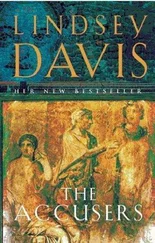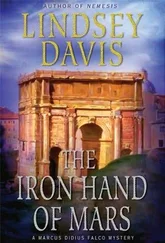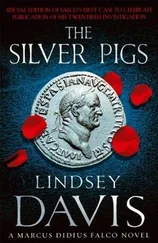Lindsey Davis - The Ides of April
Здесь есть возможность читать онлайн «Lindsey Davis - The Ides of April» весь текст электронной книги совершенно бесплатно (целиком полную версию без сокращений). В некоторых случаях можно слушать аудио, скачать через торрент в формате fb2 и присутствует краткое содержание. Год выпуска: 2013, ISBN: 2013, Издательство: Minotaur Books, Жанр: Исторический детектив, на английском языке. Описание произведения, (предисловие) а так же отзывы посетителей доступны на портале библиотеки ЛибКат.
- Название:The Ides of April
- Автор:
- Издательство:Minotaur Books
- Жанр:
- Год:2013
- ISBN:9781250023698
- Рейтинг книги:3 / 5. Голосов: 1
-
Избранное:Добавить в избранное
- Отзывы:
-
Ваша оценка:
- 60
- 1
- 2
- 3
- 4
- 5
The Ides of April: краткое содержание, описание и аннотация
Предлагаем к чтению аннотацию, описание, краткое содержание или предисловие (зависит от того, что написал сам автор книги «The Ides of April»). Если вы не нашли необходимую информацию о книге — напишите в комментариях, мы постараемся отыскать её.
The Ides of April — читать онлайн бесплатно полную книгу (весь текст) целиком
Ниже представлен текст книги, разбитый по страницам. Система сохранения места последней прочитанной страницы, позволяет с удобством читать онлайн бесплатно книгу «The Ides of April», без необходимости каждый раз заново искать на чём Вы остановились. Поставьте закладку, и сможете в любой момент перейти на страницу, на которой закончили чтение.
Интервал:
Закладка:
I quite liked sewing. I enjoyed the quiet push and tug of the needle as I pressed into the layers of tunic and facing, then jerked the thread through, and the satisfaction of smoothing the work well, so it lay flat as I made progress.
This task calmed me after another experience that had left me horrified: I had walked around the Aventine all morning, looking for more fox cages. I found several. All but one were empty and I made them safe. The last contained a young fox, dead. At some point before or after he collapsed, crows had managed to insert their beaks through the wires and peck out his eyes. I shooed them off, but then could only walk away.
Just as I finished sewing, Andronicus came. I was up in the office, seated in the balcony doorway to use the best light. At his cheery greeting, I bit the thread on the last stitch then carefully docked my needle in the tunic braid; needles are not cheap.
"Not far off weaving at a loom like a traditional wife!" I mocked myself as I tidied my work and gathered up my sewing box. My friend took that from me, inspecting the elegant casket which had been a present from my parents: fine fragrant cedarwood, with patterned ivory inlays and silver fitments. My younger sisters had enjoyed themselves finding contents: a bronze thimble, shears, hole-punch, carved bone needle-case. I had filled up the box with remnants of braid and threads, buttons and beads. To anyone else it was a jumble of untidiness, though to me each cheap treasure represented past history.
"Somebody loves you!" As he placed the decorative box on my table, Andronicus had his suspicious look. My nut-brown lovely stood there, slim and trim, with no idea how little need he had to be jealous with regard to me.
"Not a man!" I growled, knowing how he thought. "Generous parents."
"You stay close to your family."
"People who know my history never expect that-but why not?"
"You live alone," Andronicus said. "But there seems to be a great deal in the background that you hide."
"I hide nothing."
"You live in this horrible place, although you have a rich father."
"This was my father's office before me. He made his own way in the world, and so do I."
"You fell on your feet, yet you turn your back on a fortune." Andronicus seemed unable to comprehend the situation I had chosen. I suppose to a freedman money mattered too much. "You told me you came from nothing. If that is true-" His implied suggestion that I might have invented my story for effect startled me. My past was hard; why would anyone burden themselves with a miserable past unnecessarily? "-why don't you now take advantage of what is available?"
"It would seem obvious to most people. And I expect it is my father's biggest fear that any men his daughters like will adopt that attitude." As I explained the alternative, I felt my chin come up. "I don't. I never will. I appreciate good fortune, but I make my own way when I can. Anyone who is my friend will see it my way."
"I just wanted to understand." Now Andronicus had his wide eyes, his seriousness about the mouth, his manner earnest and trustworthy. "I love the way you see things, Albia!"
As if to prove it, he told me why he came. He had learned where the aediles were keeping the Cerialia foxes. That news certainly won my affection and gratitude.
What we did in the next hour was dangerous, and could have brought down public wrath on both of us. Andronicus was eager not just to show me where to go, but to join in and help me. Sometimes I did crazy things, but never before with a partner. Since our destination was the Temple of Ceres, so familiar to him yet so alien to me, it would have been pointless to quibble. Anyway, our friendship easily extended to sharing this rash adventure.
As we walked there, he asked, "What would your wonderful family think about this?"
"They would very strongly advise against it!"
Clearly the right answer. He laughed gently.
I in turn asked how he came to be allowed out. He said Faustus was chairing a big meeting about arrangements for the Cerialia Games, a duty he could not neglect, while his uncle had gone to some drunken banquet, a normal night out for Tullius. The household was unregulated. Slaves and freedmen came and went.
It was a fine evening, though cool. People were on the streets though not in great numbers. We went side by side like strolling lovers. It was too early, and still too light, for most robbers to be active, while the old ladies who maintained moral standards had gone home for mean suppers with their cats. Families who spilled out of shops and workshops took no notice of us, since we were clearly not window-shopping. Nobody would remember us. Nobody could have imagined our illegal errand.
We reached the temple. One of so many on the Aventine, its isolated position in the northwest corner overlooking the Circus Maximus meant this particular temple was turning towards the city opposite as if offering some upstart rivalry to Rome's grand official gods on the Capitol.
Ceres was benign to humans. Ceres gave us agriculture, and with it the habit of a regulated life. How could the goddess who taught mankind to plough, who discovered wheat for us, who reigned as a patroness of decent human values, of peace and justice, require the torturing of foxes? One of her companions in this ancient temple was Liber, Father Freedom, a god of wine and male virility, but- perhaps because liquor will loosen the tongue-also a champion of free speech. This temple represented a longstanding centre of rebellion against restrictive social order. What Andronicus and I intended to do at least fell within that spirit.
Not that the plebeian authorities would approve. If we were seen with the foxes-if we were caught-it would count as "an insult to Ceres." Traditionally, the penalty for that was hanging.
That night my friend was so fired up it was wonderful. He dragged me up the worn steps and through the wide-set stubby columns beneath their bleached wooden pediments, then headed into the sanctuary. I had never been inside before. In Rome most religious life takes place outside, where the altars for sacrifices stand in the open air. On the eve of the festival there was more public presence than usual. Old women were selling cakes and honeycombs from little tables set among the columns.
We slipped past them, to enter the interior unchallenged. Another old woman, in white Grecian dress, clearly the chief priestess, was tending the statue of Ceres. Her movements were creaky but she straightened the goddess's wheatsheaves and torch to her satisfaction before turning. She recognised Andronicus and perhaps looked disapproving, but made no attempt to shoo him out. She ignored me. Women were allowed here.
Andronicus was a fine actor. As if to explain our presence, in a grave voice, he began giving me a lecture about the cult statues playing guide to a curious tourist. Each in their own sanctum were three extremely handsome bronze gods, paid for from fines the aediles extracted: Ceres seated on the snake-wreathed box which contained secret items used in her mysteries, Liber with his Dionysian wineskin, Libera, associated with Proserpina, the daughter Ceres lost to the god of the Underworld, but rescued…
Unlike so many stories of the official pantheon's gods and goddesses-that randy, amoral group who seemed concerned mainly with love affairs-Mother and Maiden had a special appeal for me. Their story was the core of the festival. In a few nights' time white-robed women would be running all over the Aventine with torches, to represent the desolate goddess's desperate search for her missing daughter, when the earth dies in the dead dark of winter before the mother is reunited with her child in the light, and green shoots are allowed to sprout again. Even in the city- especially in the city where there were so many mouths to feed-the renewal of the life-sustaining grain was celebrated.
Читать дальшеИнтервал:
Закладка:
Похожие книги на «The Ides of April»
Представляем Вашему вниманию похожие книги на «The Ides of April» списком для выбора. Мы отобрали схожую по названию и смыслу литературу в надежде предоставить читателям больше вариантов отыскать новые, интересные, ещё непрочитанные произведения.
Обсуждение, отзывы о книге «The Ides of April» и просто собственные мнения читателей. Оставьте ваши комментарии, напишите, что Вы думаете о произведении, его смысле или главных героях. Укажите что конкретно понравилось, а что нет, и почему Вы так считаете.












